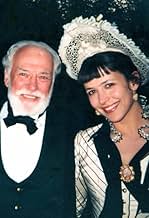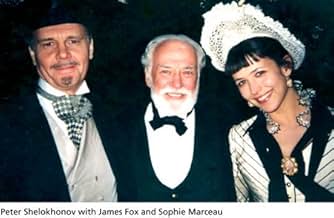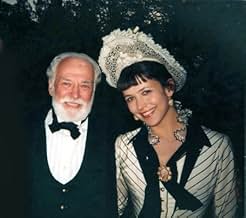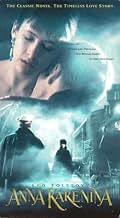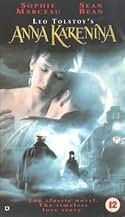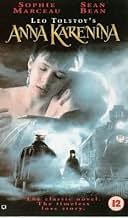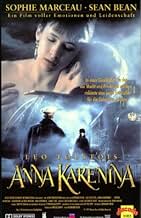CALIFICACIÓN DE IMDb
6.3/10
6.4 k
TU CALIFICACIÓN
Anna (Marceau) es una esposa y madre que tiene una aventura con el apuesto conde Vronsky. Basado en la novela de Tolstoi.Anna (Marceau) es una esposa y madre que tiene una aventura con el apuesto conde Vronsky. Basado en la novela de Tolstoi.Anna (Marceau) es una esposa y madre que tiene una aventura con el apuesto conde Vronsky. Basado en la novela de Tolstoi.
Petr Shelokhonov
- Kapitonich, Chief Butler
- (as Pyotr Sholokhov)
- Dirección
- Guionistas
- Todo el elenco y el equipo
- Producción, taquilla y más en IMDbPro
Opiniones destacadas
Which is entirely to be expected with a novel the size and complexity, I'm told, of Leo Tolstoy's "Anna Karenina", which I have not read.
I will blushingly admit that I first viewed this film mostly because of Sean Bean's presence. I found him a superb actor in the Lord of the Rings, and hoped to find more in his other works.
Truthfully, his portrayal of Vronsky feels somewhat light in this film; I attribute this to three factors: the severe compression of the novel (as happens with all film adaptations), the actual nature of the character itself, and the slightly boring task of playing mostly passion. Unlike other viewers, I found it very difficult to sympathize with Vronsky, and his repentance hollow. My heart melted somewhat, though, during his flashback to Karenina's corpse at the railway, and his brimming eyes as the train pulled away. Redeemed slightly at the very last moment.
Sophie Marceau is stunning as Anna Karenina; I found her enchanting from the start. Marceau plays the title lady with dignity, elegance, and grace; in her more intimate and emotional moments, she portrays Karenina's motherly and passionate sides with skill.
The inevitable flaws of adaptation show through in this film; there are numerous location changes, and multiple "quick" passages of time. Every event feels strung together by a thread, which they likely are, chosen for their narrative value. Yet it doesn't work, as the overall result lacks a palatable sense of cohesion. The love story of Karenina and Vronsky feels chopped and rushed, as does the tale of Levin and his Kitty -- which is too bad, since they are both the anchor narratives. The contrast of the two, however, plays well, and reminds me of the romances in Michael Ondaatje's "English Patient" (I'm well aware Tolstory precedes Ondaatje).
The greatest features of "Anna Karenina" lie in the atmosphere. Despite the out-of-place original accents of the actors, Russian is spoken skilfully, and the chosen music is beautiful and appropriately evocative of an older, grander time. and the lovely landscapes of Russia play a beautiful role in the background. The costumes and sets are breathtaking; the highlight is surely the ballroom scene, when all are attired for an evening "out" and Tchaikovsky's Swan Lake Waltz is playing.
While an excellent effort, "Anna Karenina" eventually feels like what it is: a cinematic adaptation of a novel.
I'd give it a 8 out of 10.
I will blushingly admit that I first viewed this film mostly because of Sean Bean's presence. I found him a superb actor in the Lord of the Rings, and hoped to find more in his other works.
Truthfully, his portrayal of Vronsky feels somewhat light in this film; I attribute this to three factors: the severe compression of the novel (as happens with all film adaptations), the actual nature of the character itself, and the slightly boring task of playing mostly passion. Unlike other viewers, I found it very difficult to sympathize with Vronsky, and his repentance hollow. My heart melted somewhat, though, during his flashback to Karenina's corpse at the railway, and his brimming eyes as the train pulled away. Redeemed slightly at the very last moment.
Sophie Marceau is stunning as Anna Karenina; I found her enchanting from the start. Marceau plays the title lady with dignity, elegance, and grace; in her more intimate and emotional moments, she portrays Karenina's motherly and passionate sides with skill.
The inevitable flaws of adaptation show through in this film; there are numerous location changes, and multiple "quick" passages of time. Every event feels strung together by a thread, which they likely are, chosen for their narrative value. Yet it doesn't work, as the overall result lacks a palatable sense of cohesion. The love story of Karenina and Vronsky feels chopped and rushed, as does the tale of Levin and his Kitty -- which is too bad, since they are both the anchor narratives. The contrast of the two, however, plays well, and reminds me of the romances in Michael Ondaatje's "English Patient" (I'm well aware Tolstory precedes Ondaatje).
The greatest features of "Anna Karenina" lie in the atmosphere. Despite the out-of-place original accents of the actors, Russian is spoken skilfully, and the chosen music is beautiful and appropriately evocative of an older, grander time. and the lovely landscapes of Russia play a beautiful role in the background. The costumes and sets are breathtaking; the highlight is surely the ballroom scene, when all are attired for an evening "out" and Tchaikovsky's Swan Lake Waltz is playing.
While an excellent effort, "Anna Karenina" eventually feels like what it is: a cinematic adaptation of a novel.
I'd give it a 8 out of 10.
Visually, this film is gorgeous. Sophie Marceau is perfect as Anna and Alfred Molina also shines. Sean Bean, known for finding the humanity in the worst of characters, is the most likeable, sympathetic and attractive Vronsky I have seen. He does not portray the transformation of the selfish, spoilt, wealthy and aristocratic mother's darling into a deeply remorseful, more mature individual who learns that there is a price to pay for taking whatever you want and you had better consider the price worth it. A pity as the contrasting story of Levin (Alfred Molina) and his unselfish devotion to Princess Kitty requires that the point be made. You reap what you sow. Similarly, James Fox is too tolerant and long-suffering as Karenin. Tostoy's Karenin is a self-important bureaucrat who disguises his revenge on Anna as piety. HOWEVER...maybe not be accurate Tolstoy but the sheer niceness of all the characters makes one care far more when tragedy strikes than I ever did when I read the book. Gorgeous music also.
I saw this movie almost accidentally and I LOVED it! It made me a fan of Sophie Marceau, a beautiful and talented French actress. To my delight Sophie is starring in some upcoming movies (which I will not miss). I would recommend this movie to anyone looking for a movie with all the components that makes a classic. Too bad it didn't hit the mainstream, it was very under-rated. Bottom line: I loved this movie, and I am usually quite picky about which movies I say that about!
To be honest, I have not read this book. I have heard that it was a classic and all those other things that people say about his book, but really had no idea what the story is about. Actually, the main reason that I watched this movie, was that Sean Bean was in it(I had previously seen him in Lord of the Rings, and really enjoyed him). I was surprised to find this story so engaging. I thought that he was amazing in this movie, very charming. He just has this intangible quality that always has me rooting for him.
This is the first movie that I have ever seen Sophie Marceau in(playing Anna Karenina) and I found that she portrays Anna with a delicate grace, that makes you understand Vronsky's(Bean) dogged pursuit of her.
True, I have to say that I found the end a little disappointing, and heart-wrenching. Sean Bean shines at the end of the movie, I think he really shows well just how much Vronsky finally realizes he has lost.
This is the first movie that I have ever seen Sophie Marceau in(playing Anna Karenina) and I found that she portrays Anna with a delicate grace, that makes you understand Vronsky's(Bean) dogged pursuit of her.
True, I have to say that I found the end a little disappointing, and heart-wrenching. Sean Bean shines at the end of the movie, I think he really shows well just how much Vronsky finally realizes he has lost.
According to an earlier review, this movie is supposed to be "just plan awful." The writer probably meant "plain" instead of "plan," and that misspelling may be an indication of the quality of the review.
There is much to be said for the viewpoint that this film version of Tolstoy's novel, starring Sophie Marceau, must certainly be one of the greatest versions ever produced.
Tolstoy himself lived to see just the beginning of the era of the motion picture and was said to have been fascinated by the possibilities the new medium presented. If so, he would no doubt have been quite astonished at the beauty and the extraordinary quality of this rendition of his story about Anna Karenina. The production values are among the highest there could possibly be. The costumes, the cinematography, and the sets unlike earlier versions, the film was shot on location in St. Petersburg and elsewhere in Russia are at such a remarkable level that the action almost does appear to be really taking place in the Czarist period at the end of the nineteenth century.
As for Sophie Marceau's mild French accent which the above-mentioned reviewer found so irritating it is quite likely that many upper-classes Russians of the period actually did speak with a French accent. It was not Russian but French that was the dominant language among the Russian nobility and aristocracy of the time for some, French was in fact their native language, since many of them never learned to speak Russian at all, except perhaps a few words and phrases they could use to communicate with the servants.
What is perhaps most remarkable of all in this film is the utterly believable way that the behavior of the of characters is presented. Their motives are suggested with great subtlety, not in the somewhat simplistic tones of the (nevertheless still magnificent) MGM version of the film that starred Greta Garbo seventy years ago. Anna's husband is not a monster, for example, in this new version, but a rather pathetic, right-wing government bureaucrat with obsessively strict moral values. Moreover, the portrayal of Anna's behavior throughout the film, and especially in the final scenes, is a masterpiece of sympathetic psychological insight and understanding.
This film is a for the time being, anyway neglected classic.
There is much to be said for the viewpoint that this film version of Tolstoy's novel, starring Sophie Marceau, must certainly be one of the greatest versions ever produced.
Tolstoy himself lived to see just the beginning of the era of the motion picture and was said to have been fascinated by the possibilities the new medium presented. If so, he would no doubt have been quite astonished at the beauty and the extraordinary quality of this rendition of his story about Anna Karenina. The production values are among the highest there could possibly be. The costumes, the cinematography, and the sets unlike earlier versions, the film was shot on location in St. Petersburg and elsewhere in Russia are at such a remarkable level that the action almost does appear to be really taking place in the Czarist period at the end of the nineteenth century.
As for Sophie Marceau's mild French accent which the above-mentioned reviewer found so irritating it is quite likely that many upper-classes Russians of the period actually did speak with a French accent. It was not Russian but French that was the dominant language among the Russian nobility and aristocracy of the time for some, French was in fact their native language, since many of them never learned to speak Russian at all, except perhaps a few words and phrases they could use to communicate with the servants.
What is perhaps most remarkable of all in this film is the utterly believable way that the behavior of the of characters is presented. Their motives are suggested with great subtlety, not in the somewhat simplistic tones of the (nevertheless still magnificent) MGM version of the film that starred Greta Garbo seventy years ago. Anna's husband is not a monster, for example, in this new version, but a rather pathetic, right-wing government bureaucrat with obsessively strict moral values. Moreover, the portrayal of Anna's behavior throughout the film, and especially in the final scenes, is a masterpiece of sympathetic psychological insight and understanding.
This film is a for the time being, anyway neglected classic.
¿Sabías que…?
- TriviaThis was the first western production of "Anna Karenina" to be filmed in Russia (St. Petersburg).
- ErroresDuring the movie, title cards inform the viewer that the story arch unfolds in the years 1880 to 1882 - yet at the end of the movie Vronsky leaves to fight in the Russo-Turkish war of 1877- 1878.
- Citas
Anna Karenina: What are you doing here?
Vronsky: You know that I have come to be where you are. I cannot help myself.
- ConexionesReferenced in 13 posterunek: Kalambury filmowe (1998)
- Bandas sonorasSymphony No. 6 in B Minor, op. 74 (Pathetique)
Written by Pyotr Ilyich Tchaikovsky (as Peter Ilyich Tchaikovsky)
Performed by The St. Petersburg Philharmonic Orchestra
Conducted by Georg Solti (as Sir Georg Solti)
Courtesy of Icon Records and London Records
Selecciones populares
Inicia sesión para calificar y agrega a la lista de videos para obtener recomendaciones personalizadas
- How long is Anna Karenina?Con tecnología de Alexa
Detalles
- Fecha de lanzamiento
- Países de origen
- Sitios oficiales
- Idiomas
- También se conoce como
- Leo Tolstoy's Anna Karenina
- Locaciones de filmación
- Productoras
- Ver más créditos de la compañía en IMDbPro
Taquilla
- Presupuesto
- USD 35,000,000 (estimado)
- Total en EE. UU. y Canadá
- USD 858,553
- Fin de semana de estreno en EE. UU. y Canadá
- USD 75,268
- 6 abr 1997
- Total a nivel mundial
- USD 858,553
- Tiempo de ejecución
- 1h 48min(108 min)
- Color
- Mezcla de sonido
- Relación de aspecto
- 2.35 : 1
Contribuir a esta página
Sugiere una edición o agrega el contenido que falta


